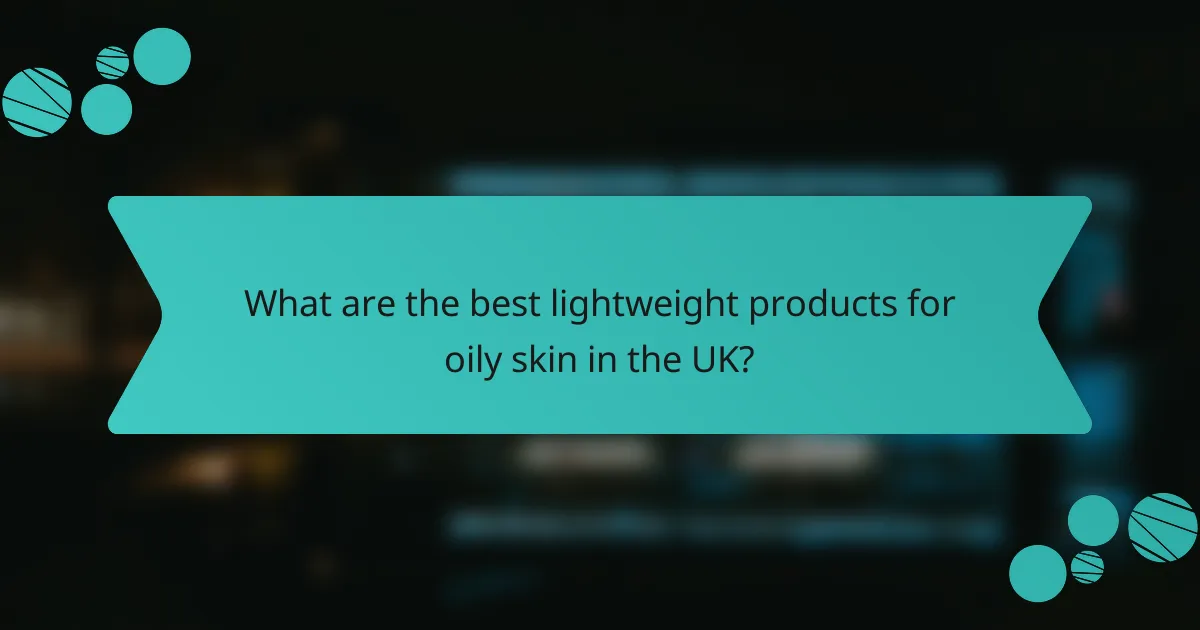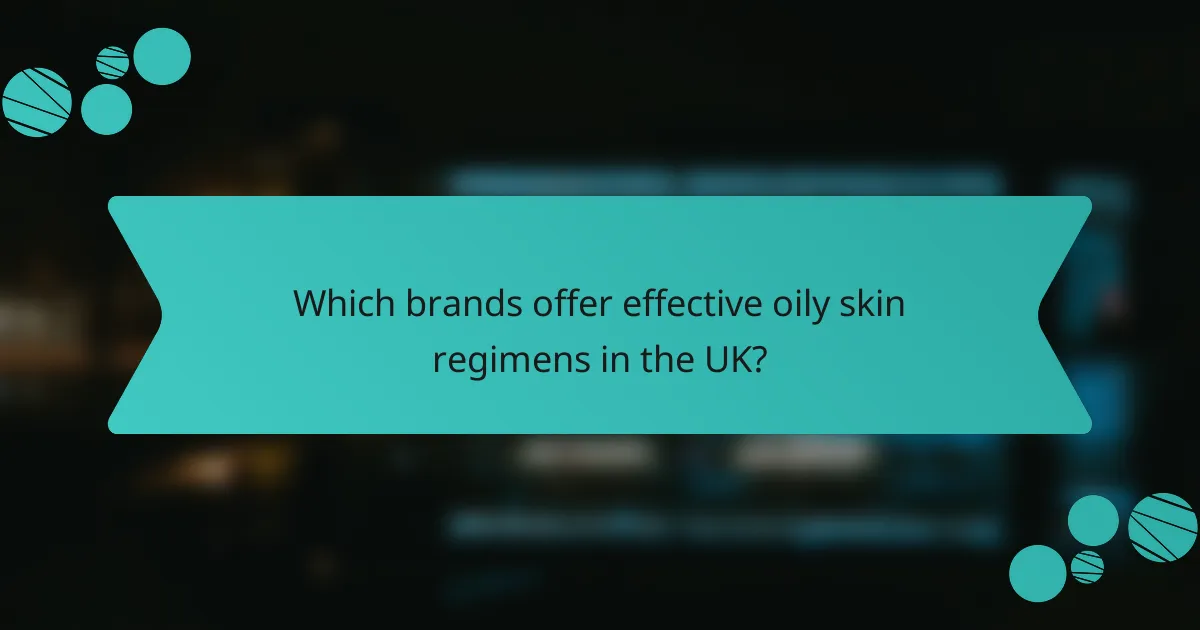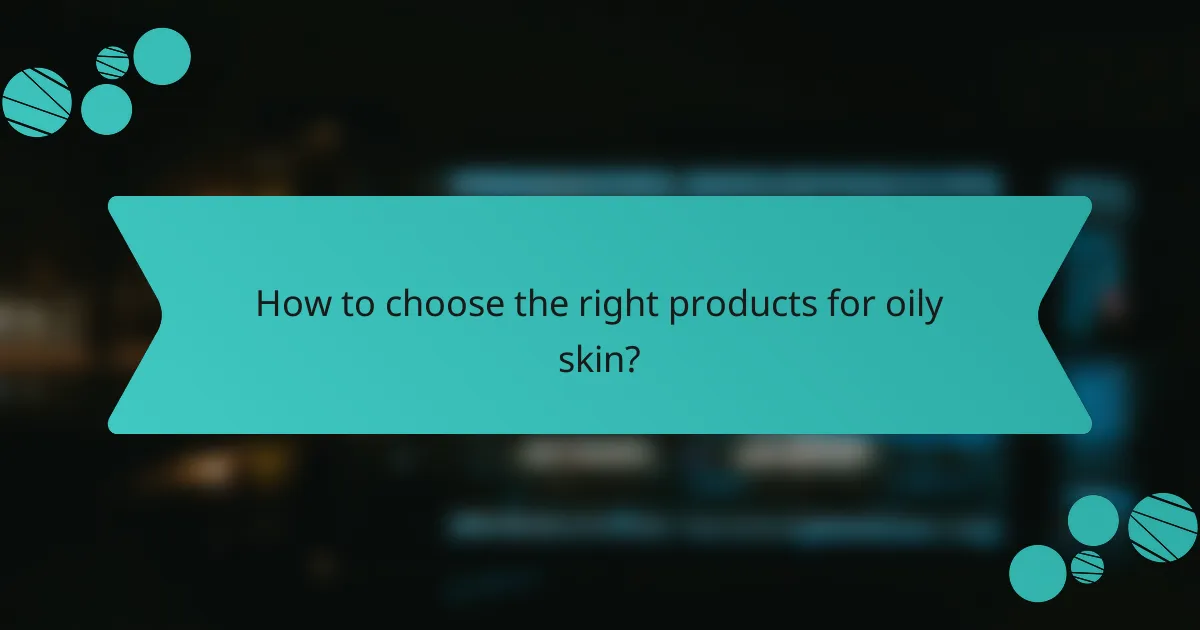For those with oily skin, finding the right regimen is crucial to achieving a balanced complexion. Lightweight products that focus on oil control while providing necessary hydration can help maintain skin health without clogging pores. By using non-greasy formulations that absorb quickly, you can effectively manage excess sebum and prevent dryness, ensuring your skin stays supple and breakout-free.

What are the best lightweight products for oily skin in the UK?
The best lightweight products for oily skin in the UK focus on oil control while providing adequate hydration. Look for formulations that are non-greasy, absorb quickly, and help maintain a balanced complexion without clogging pores.
Gel moisturizers
Gel moisturizers are ideal for oily skin as they provide hydration without added oils. These products typically contain water-based ingredients that absorb quickly, leaving the skin feeling refreshed and not greasy.
When choosing a gel moisturizer, look for those with ingredients like hyaluronic acid or aloe vera, which hydrate without weighing the skin down. Brands like Neutrogena and La Roche-Posay offer popular options that cater specifically to oily skin types.
Oil-free serums
Oil-free serums are lightweight and designed to target specific skin concerns such as acne or enlarged pores. These serums often contain active ingredients like salicylic acid or niacinamide, which help control oil production and reduce breakouts.
For best results, apply a few drops of serum after cleansing and before moisturizing. Look for serums that are labeled as non-comedogenic to ensure they won’t clog pores.
Lightweight sunscreens
Lightweight sunscreens are essential for oily skin, providing sun protection without a heavy feel. Look for gel or fluid formulations that are oil-free and specifically designed for oily or acne-prone skin.
Choose a sunscreen with a matte finish to help control shine throughout the day. Brands like Bioderma and Vichy offer effective options that protect against UV rays while keeping the skin feeling light and fresh.
Water-based foundations
Water-based foundations are a great choice for oily skin as they provide coverage without adding excess oil. These foundations typically have a lightweight texture that allows the skin to breathe while offering a natural finish.
When selecting a water-based foundation, look for those labeled as oil-free and non-comedogenic. Popular options include Fenty Beauty Pro Filt’r Hydrating Foundation and Maybelline Fit Me Matte + Poreless Foundation.
Non-comedogenic creams
Non-comedogenic creams are formulated to avoid clogging pores, making them suitable for oily skin. These creams often contain lightweight ingredients that provide moisture without contributing to oiliness.
When shopping for non-comedogenic products, check labels for this designation and opt for creams that include beneficial ingredients like glycerin or dimethicone. Brands such as Cetaphil and Clinique offer effective non-comedogenic options that cater to oily skin types.

How to control oil production effectively?
Controlling oil production effectively involves using targeted products and techniques that reduce excess sebum while maintaining skin hydration. A balanced approach is essential to prevent dryness, which can lead to increased oiliness.
Use of salicylic acid
Salicylic acid is a beta hydroxy acid known for its ability to penetrate pores and dissolve excess oil. It helps to prevent breakouts by exfoliating the skin and reducing inflammation, making it a key ingredient for oily skin regimens.
When incorporating salicylic acid, look for products with concentrations between 0.5% and 2%. Start with lower concentrations to assess skin tolerance, applying it 1-2 times a week and gradually increasing frequency as needed.
Incorporating clay masks
Clay masks are effective for absorbing excess oil and impurities from the skin. They typically contain ingredients like bentonite or kaolin, which draw out toxins and help minimize the appearance of pores.
For best results, use a clay mask once a week. Apply a thin layer to clean skin, leave it on for about 10-15 minutes, and rinse thoroughly. Avoid using it too frequently to prevent over-drying the skin.
Regular exfoliation
Regular exfoliation helps to remove dead skin cells that can clog pores and contribute to oiliness. Chemical exfoliants, like alpha and beta hydroxy acids, are often more effective for oily skin than physical scrubs.
Exfoliate 1-3 times a week depending on your skin’s sensitivity. Choose gentle formulations with ingredients like glycolic or lactic acid, and always follow up with a moisturizer to maintain hydration balance.

What hydration balance is ideal for oily skin?
The ideal hydration balance for oily skin involves maintaining moisture without adding excess oil. This balance helps prevent breakouts while ensuring the skin remains healthy and supple.
Hydrating ingredients
For oily skin, look for lightweight hydrating ingredients such as hyaluronic acid, glycerin, and aloe vera. These components attract moisture without clogging pores or adding greasiness.
Additionally, consider products with niacinamide, which helps regulate oil production while providing hydration. Avoid heavy oils and creams that can exacerbate oily skin conditions.
Importance of pH balance
Maintaining a balanced pH is crucial for oily skin, as it helps control oil production and supports skin barrier function. Ideally, products should have a pH close to the skin’s natural level, around 4.5 to 5.5.
Using products with a disrupted pH can lead to increased oiliness or dryness, causing the skin to react negatively. Choose gentle cleansers and toners that promote a healthy pH balance.
Frequency of hydration
Hydration should be a consistent part of your skincare routine, ideally twice daily. Morning and evening applications of hydrating products can help maintain moisture levels without overwhelming oily skin.
Be mindful of seasonal changes; during hotter months, you may need lighter products, while cooler months might require slightly richer formulations. Always adjust based on how your skin feels and reacts.

Which brands offer effective oily skin regimens in the UK?
Several brands in the UK specialize in effective regimens for oily skin, focusing on lightweight products that control oil while maintaining hydration. Key players include La Roche-Posay, Neutrogena, and Clinique, each offering tailored solutions to manage oily skin effectively.
La Roche-Posay
La Roche-Posay is renowned for its dermatologically tested products that cater specifically to oily skin. Their formulations often include thermal spring water, which soothes the skin while controlling excess oil. Look for their Effaclar range, which features lightweight moisturizers and cleansers designed to reduce shine and prevent breakouts.
When using La Roche-Posay products, consider incorporating a gentle exfoliating cleanser a few times a week to help unclog pores. Avoid harsh scrubs, as they can irritate oily skin and lead to increased oil production.
Neutrogena
Neutrogena offers a variety of products aimed at oily skin, particularly their Oil-Free Acne Wash and Hydro Boost Gel-Cream. These products are formulated to provide hydration without adding excess oil, making them ideal for oily skin types. Their lightweight textures absorb quickly, leaving the skin feeling fresh.
For best results, use Neutrogena’s products consistently, and consider layering their gel-cream over a lightweight serum for added hydration. Always patch-test new products to avoid adverse reactions, especially if you have sensitive skin.
Clinique
Clinique’s approach to oily skin focuses on a three-step regimen: cleanse, exfoliate, and moisturize. Their products, such as the Clarifying Lotion and Dramatically Different Moisturizing Gel, are designed to balance oil production while providing essential hydration. These formulations are fragrance-free and suitable for sensitive skin.
To maximize the effectiveness of Clinique’s regimen, follow the steps in order and allow each product to absorb fully before applying the next. This method ensures optimal results and helps prevent clogged pores.

What are the common mistakes in oily skin care?
Common mistakes in oily skin care often lead to increased oiliness and breakouts. Key errors include over-cleansing, using heavy products, and neglecting hydration, all of which can disrupt the skin’s natural balance.
Over-cleansing
Over-cleansing can strip the skin of its natural oils, prompting it to produce even more oil in response. This can lead to a vicious cycle of dryness and excess oil production, worsening the overall condition of oily skin.
To avoid this mistake, cleanse your face twice daily with a gentle, foaming cleanser that targets oil without being overly harsh. Look for products containing salicylic acid or tea tree oil, which can help manage oil levels effectively.
Using heavy products
Many individuals with oily skin mistakenly use heavy creams and oils, thinking they need extra moisture. However, these products can clog pores and exacerbate oiliness, leading to breakouts.
Instead, opt for lightweight, non-comedogenic products that provide hydration without adding excess oil. Gel-based moisturizers or oil-free lotions are excellent choices that help maintain moisture balance without overwhelming the skin.
Ignoring hydration
Ignoring hydration is a significant mistake for those with oily skin. Many believe that since their skin is oily, it does not require additional moisture, which can lead to dehydration and increased oil production.
Incorporate hydrating products like hyaluronic acid serums or lightweight moisturizers to keep the skin balanced. Aim for products that hydrate without adding oil, ensuring your skin remains healthy and less prone to breakouts.

How to choose the right products for oily skin?
Selecting the right products for oily skin involves focusing on lightweight formulations that control excess oil while maintaining hydration. Look for non-comedogenic ingredients that won’t clog pores and consider products with mattifying properties to reduce shine throughout the day.
Understanding skin types
Skin types are generally categorized into four main groups: oily, dry, combination, and sensitive. Oily skin is characterized by excess sebum production, leading to a shiny appearance and potential acne breakouts. Recognizing your skin type is crucial for choosing appropriate skincare products.
To determine if you have oily skin, observe how your skin feels and looks throughout the day. If you notice a significant shine, particularly on the forehead, nose, and chin (often referred to as the T-zone), you likely have oily skin. This type may also be prone to enlarged pores and blackheads.
When selecting products for oily skin, prioritize those labeled as “oil-free” or “mattifying.” Ingredients like salicylic acid, witch hazel, and clay can help absorb excess oil and prevent breakouts. Avoid heavy creams that can exacerbate oiliness and lead to clogged pores.
